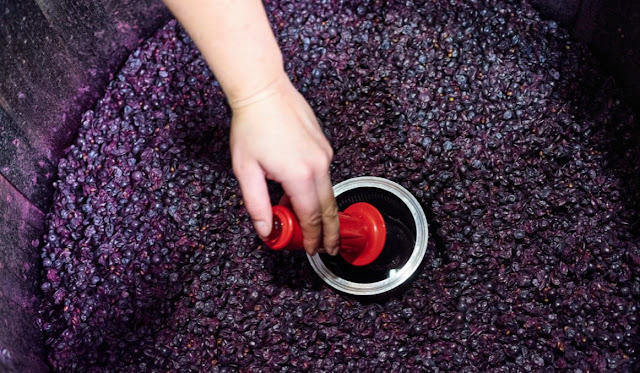- Get link
- X
- Other Apps
- Get link
- X
- Other Apps
Natural Wine and Your Health

The world of wine has seen a significant shift in recent years, with an increasing interest in natural wine. This growing trend is not just about the taste and authenticity of wine but also its potential impact on our health. Natural wine is often touted as a healthier alternative to conventional wines due to its minimal intervention in winemaking processes and unique characteristics. In this article, we'll explore the concept of natural wine, its potential health benefits, and the considerations to keep in mind when incorporating it into your lifestyle.
Understanding Natural Wine
Natural wine is an artisanal approach to winemaking that involves minimal intervention in the vineyard and the cellar.

Unlike conventional wines, which may contain additives such as commercial yeast, sulfites, and various chemicals, natural wine is made using traditional methods that prioritize the purity of the grapes and the terroir, or the specific environmental factors that influence wine characteristics.
Key Characteristics of Natural Wine:

- Minimal Use of Additives: Natural winemakers avoid using additives like sulfur dioxide (sulfites) to preserve the wine, relying instead on the natural fermentation process to maintain its integrity.
- Organic or Biodynamic Farming: The grapes used for natural wine are typically grown using organic or biodynamic farming practices, which minimize the use of synthetic pesticides and fertilizers.
- Wild Yeast Fermentation: Natural wine often undergoes spontaneous fermentation, where wild yeast from the vineyard or cellar is used to ferment the grapes, giving each wine a unique and individual character.
- Low to No Filtration: Natural wines are usually unfiltered or minimally filtered to preserve their natural flavors and aromas.
- Unique Flavors: The minimal intervention approach results in wines that can exhibit a wider range of flavors and aromas, reflecting their terroir and the specific grape varieties used.
Potential Health Benefits

- Lower Sulfite Content: Sulfites, commonly used in conventional winemaking, can trigger allergic reactions in some individuals. Natural wines typically have lower sulfite levels, making them a better choice for those with sulfite sensitivities.
- Fewer Chemical Residues: Because natural wine is made from grapes grown with minimal chemical interventions, it is likely to have fewer chemical residues, making it a more wholesome choice.
- Biodynamic and Organic Farming: Many natural winemakers practice organic or biodynamic farming, which contributes to healthier soil, reduces pollution, and may result in grapes with higher nutrient content.
- Unique Microbial Profile: The use of wild yeast for fermentation may introduce beneficial microbes into the wine, which some believe can positively influence gut health.
- Lower Alcohol Content: Some natural wines have slightly lower alcohol content than their conventional counterparts, making them a preferred option for those who want to enjoy wine without excessive alcohol intake.
- Enhanced Sensory Experience: Natural wines often have a more complex and authentic flavor profile, which can enhance the overall wine-drinking experience and potentially encourage moderate consumption.
Considerations and Moderation

While natural wine may offer some health benefits, it's essential to consume it in moderation. Excessive alcohol consumption can lead to a variety of health issues, including liver damage, addiction, and an increased risk of accidents. When incorporating natural wine into your lifestyle, keep the following in mind:
- Alcohol Content: Pay attention to the alcohol content, as it can vary from one natural wine to another. Consume in moderation to avoid overindulgence.
- Sulfite Sensitivity: If you have a sulfite sensitivity or allergy, natural wine may be a more suitable option for you, but it's essential to be aware that some natural wines still contain minimal sulfites.
- Individual Tolerance: Everyone's tolerance to alcohol is different. Be mindful of your own limits and avoid excessive drinking.
- Pairing with Food: Natural wines often pair well with a variety of dishes, particularly those prepared with fresh and natural ingredients. Enjoying them with a balanced diet can enhance the overall experience.
- Explore Variety: The world of natural wine is diverse, with numerous flavor profiles and characteristics to explore. Experiment with different bottles to find what suits your palate best.
- Responsible Drinking: Regardless of the type of wine you choose, always drink responsibly and never drink and drive. Ensure that you understand your own limits and know when to stop.
Conclusion


Natural wine, with its minimal intervention winemaking processes and unique characteristics, is gaining popularity in the wine world. While it offers potential health benefits such as lower sulfite content, fewer chemical residues, and a more authentic flavor profile, it is essential to approach natural wine with the same caution as any alcoholic beverage. Enjoying natural wine in moderation and being aware of your own sensitivities and tolerance levels are crucial for a healthy and enjoyable wine-drinking experience. Whether you are a wine enthusiast or someone looking for a more wholesome alternative, natural wine has something to offer – a journey of exploration, flavors, and a connection to the land from which it originates.
Comments
Post a Comment